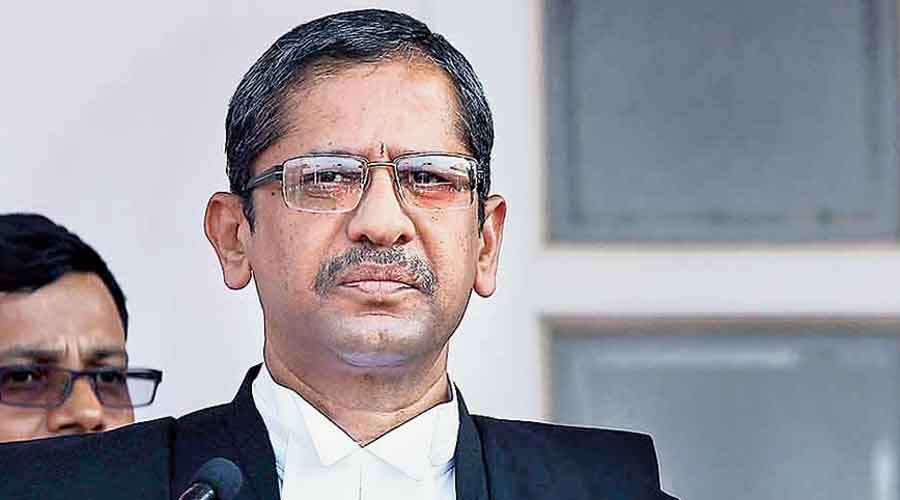Courts in India still operate from "dilapidated structures, without proper facilities" as good infrastructure for judiciary has been neglected after the British left, rued Chief Justice of India (CJI) N V Ramana on Saturday.
To address this issue, he championed the cause for setting up of National Judicial Infrastructure Corporation (NJIC).
He also talked about the 1975 verdict of Justice Jagmohanlal Sinha of the Allahabad High Court of disqualifying then prime minister Indira Gandhi on charges of electoral malpractices was a judgment of "great courage" that "shook" the nation, leading to imposition of Emergency.
"In 1975, it was Justice Jagmohanlal Sinha from the Allahabad High Court who passed the judgment that shook the nation, when he disqualified Smt. Indira Gandhi. It was a judgment of great courage, which could be said to have directly resulted in the declaration of Emergency. The consequences of which I do not want to elaborate now," Justice Ramana said.
The CJI, who along with President Ram Nath Kovind took part in programmes including the foundation stone-laying ceremony of the Uttar Pradesh National Law University in Allahabad and a new building complex of the Allahabad High Court here, stressed the importance of strengthening judicial infrastructure in the country.
“Courts in India still operate from dilapidated structures, without proper facilities. Such a situation is severely detrimental to the experience of litigants and lawyers. It is an unpleasant work environment for court staff and judges, making it difficult to effectively perform their functions. We neglected and failed to focus on providing good infrastructure for courts in India after the British left,” Justice Ramana said.
The head of the judiciary, who spoke few lines in Hindi at the start of his speech, said the importance of strengthening judicial infrastructure cannot be overstated.
“That is the reason why I am championing the National Judicial Infrastructure Corporation (NJIC), which will develop concepts of the National Court Development Project and its implementation. The NJIC shall be along the lines of different infrastructure development statutory bodies that work towards creating National Assets across the country. One of the design principles that the NJIC will follow, is socially responsible and inclusive architecture,” he said.
“Sufficient judicial infrastructure can help improve access to justice, by catering to the ever-rising number of cases and litigants, and their changing needs,” he said.
Hinting towards the “very worrying numbers” of pending criminal cases in Allahabad High Court, the CJI referred to the proposed construction of the new multi-level parking and advocates chambers complex and said this would re-energise bar and bench in tackling the huge pendency.
“I hope that this new complex will re-energise the Allahabad Bar. I do not want to point any fingers or lay any blame regarding the pendency in the Allahabad High Court relating to criminal cases, which is very worrying. I request the Allahabad Bar and bench, to work together and cooperate to resolve this issue,” he said.
The CJI lauded the efforts of President Kovind for his role in helping the cause of poor litigants and said, “It was his idea to translate the judgments of the Supreme Court to vernacular languages to increase access to justice, which has now been implemented.”
At the outset, the CJI referred to the rich history of the city and said that this was the home to legendary freedom fighters and gave prime ministers and five chief justices to independent India.
“In 1975, it was Justice Jagmohanlal Sinha from the Allahabad High Court who passed the judgment that shook the nation, when he disqualified Indira Gandhi. It was a judgment of great courage, which could be said to have directly resulted in the declaration of Emergency. The consequences of which I do not want to elaborate now,” he said.
The CJI also unveiled the portrait of legendary late advocate Anand Bhushan Saran, the father of sitting Supreme Court judge Vineet Saran and termed him as ‘one of the best and most respected senior advocates from Allahabad’ who was well known for his wit and intellect, and for his ability to come up with practical solutions on the spot.










